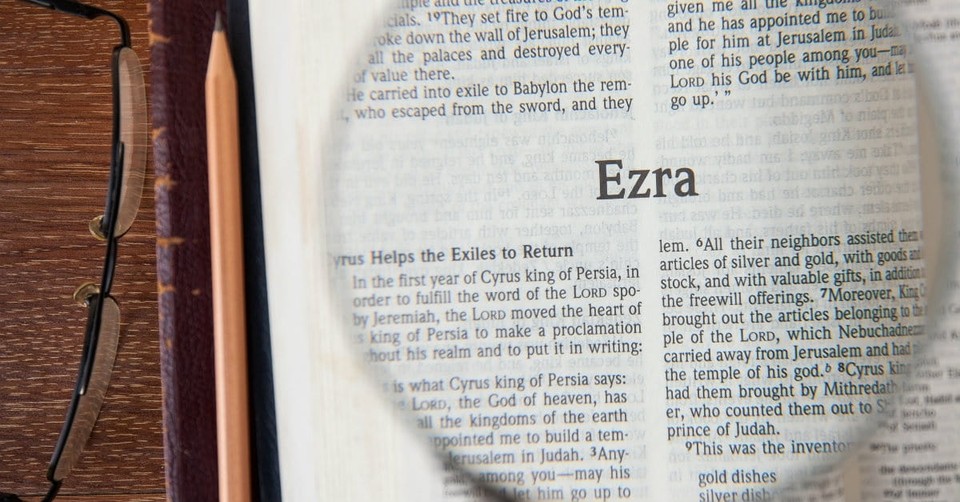Why Study the Books of Ezra and Nehemiah?

Why Study the Books of Ezra and Nehemiah?
This is a guest post by Kathleen Nielson, author of Ezra and Nehemiah: A 12-Week Study. The following article is taken from Crossway.org; used with permission.
Be Drawn to the Story
There’s nothing like a really good story. That’s the first reason I often give for studying the Old Testament books of Ezra and Nehemiah.
People in all times and places are naturally drawn to stories. We live daily in stories, moving from beginning to end—and leaning forward to see what will happen next. A good story has a shape we recognize: with characters in a setting, some sort of conflict that rises, and then some kind of resolution. How wonderful that God inspired his revelation to us in a whole array of genres, with narrative playing a central role in revealing salvation history. Ezra and Nehemiah together give a compelling account of the final piece of Old Testament history, in which God’s people are restored to the land he promised them, after suffering exile because of their sinful rebellion.
This sounds like resolution—but conflict arises from the intense struggle to rebuild Jerusalem and to be restored as God’s people called to live and worship there. The prospects are bleak: they are a poor remnant serving a foreign king; Jerusalem and its temple are broken down; enemies threaten outside the walls; sin arises among them.
The main character in this narrative is the Lord God. Other central characters serve God by leading his people—Zerubbabel, Ezra, and Nehemiah. We might be tempted to focus exclusively on their wise and godly leadership; these men are great examples indeed, and Nehemiah especially is a forceful and dramatic figure. The writers, however (including Ezra and Nehemiah as first-person narrators), consistently point to the sovereign God directing the action. It is God who moves the hearts of the Persian kings to enable this restoration. Repeatedly we see God’s hand: guiding kings, delivering from enemies, restoring his people to his promised place.
Holding the Biblical Story Together
We’re already glimpsing the second reason to study Ezra and Nehemiah: they hold the Bible’s story together. This post-exilic history is the final Old Testament episode in a story God himself began in Eden—really before the foundations of the earth. This main character is the eternal God who created the earth and everything in it; who mercifully promised salvation to the first sinners back in that garden; who created a people for himself through the seed of Abraham and promised blessing on and through that seed.
In these books we see Abraham’s seed restored and blessed—again. Repeated blessings throughout generations had been answered only by repeated rebellion, and yet God in his mercy kept his hand on them, forgave them when they repented, and remained faithful to his promise that through their seed all nations would be blessed. So here they are, still a people, still privileged to worship in Jerusalem’s temple, still looking for the fulfillment of all God’s promises.
These books form the crucial lynchpin holding the Old and New Testaments together. We often ignore this post-exilic period as a time when nothing much happened. And yet in this period God was manifesting his faithfulness. He was restoring his people to hear and obey his Word. He was preparing the way for the promised king that would come from their seed.
Be Drawn to Jesus
Here’s the third and greatest reason to study Ezra and Nehemiah: they draw us to Jesus. The redemption from exile is so marvelous and yet so inadequate; reading these books makes us yearn for a greater redemption. At the close of Old Testament history, there is light but it is still dim. Only with the coming of Jesus does the light break forth.
We live out our part of the story today having seen the fulfillment of all God’s promises, in Christ; these books highlight our privileged part in salvation history. But until the story’s final consummation, we are called to live as God’s people under his good hand, listening to his Word, believing the revelation of God’s promises. Ezra and Nehemiah help us hear that call and follow it, as we follow the Lord Jesus Christ.
Kathleen B. Nielson (PhD, Vanderbilt University) serves as the director of women’s initiatives for the Gospel Coalition. She is a popular conference speaker and the author or editor of numerous books, including Ruth and Esther: A 12-Week Study, and coeditor (with D. A. Carson) of Here Is Our God and (with Gloria Furman) Word-Filled Women's Ministry. Kathleen and her husband, Niel, have three grown sons, two beautiful daughters-in-law, and a growing number of grandchildren.
Publication date: August 25, 2016
Originally published August 25, 2016.





